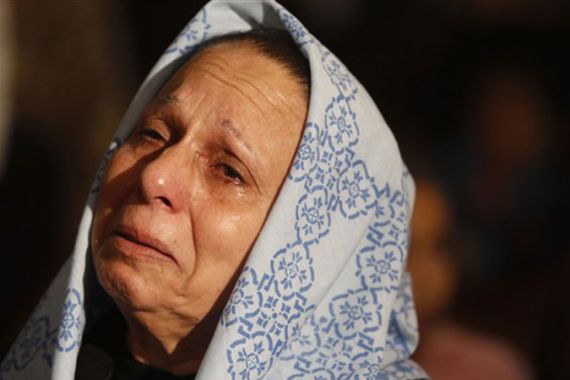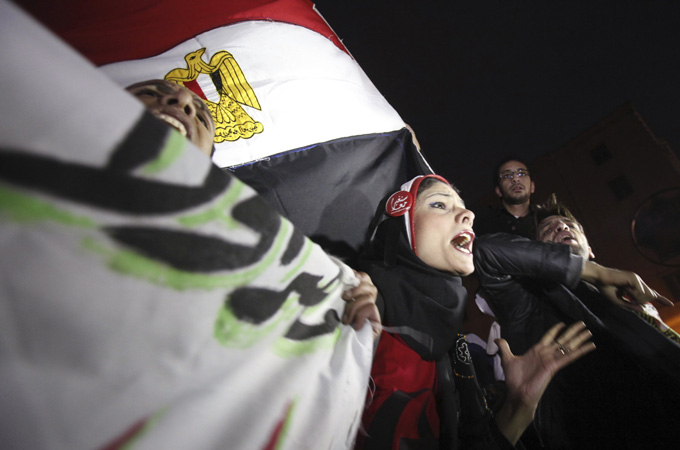The Arab world must face its demons
Attacks on Christians are a wake-up call for fragmented Arab societies where disenfranchisement breeds bigotry.

 |
| The Arab world must see the attacks on Christians in Egypt and Iraq as a wake-up call [Reuters] |
In the wake of the recent attack on Coptic Christians in Egypt, Nicolas Sarkozy, the French president, warned that Christians face a campaign of “religious cleansing in the Middle East”. But, given Western governments’ colonial history and double standards on human rights, Arab Christians would be better served by an end to destructive Western intervention in the region than by sympathetic statements.
This Western show of concern is not only hypocritical and damaging to social cohesion, but could serve to further ignite the growing wave of sectarianism sweeping the region. It was, after all, Western colonial powers that planted the seeds of the divisions that haunt the Arab world to this day and the US invasion and occupation of Iraq that unleashed the sectarian strife from which it is reeling.
As an Arab Christian, originally from Bethlehem, I am offended to hear Western leaders pretend to defend Arab Christians, while they either do nothing to stop or actively support Israeli violations of the human rights and dignity of the Palestinian people – Muslim and Christian alike.
The hate in our midst
But this is not to say that Arab societies do not also bear the blame for nurturing the bigotry and hate in our midst.
The attacks on Christian worshippers, first in Iraq and now in Egypt, should serve as a wake-up call for the governments and citizens of the Arab world.
The region’s social cohesion has for some time been at risk of total implosion. Repression and economic disenfranchisement have bred extremism, particularly among the young – many of whom despair of a secure, let alone successful, future.
Most Arab governments, with complete Western support, backed Islamic fundamentalists with the aim of undercutting the secular wave of pan-Arab nationalism and leftist activism that engulfed the region during the 1950s, 1960s and part of the 1970s.
In turn, Western governments, with the total complicity of many Arab states, used Islamic groups to fight communism, funding groups that rallied to the battle against the Soviet occupation of Afghanistan as a religious war against communism. A wave of extremists who advocated a very narrow and distorted interpretation of Islam – devoid of the tolerance the ancient religion espouses – was unleashed.
The emergence of al-Qaeda, in part as an expression of anger towards Western interventionism, has also given a voice to prejudiced views of ‘the other’, including Arab and other Christians.
But the massacres in Iraq and Egypt reveal that the language of hate that has been pervading some Islamic websites and extremist groups has not been adequately countered and addressed by Muslim scholars and intellectuals.
Constituency of the oppressed
Islam is being manipulated by bigots and quasi-intellectuals who thrive on feeding hate to a constituency of young people frustrated by foreign domination and social injustice.
The carnage at the Alexandria church was carried out by a young man who saw Egyptian Christians as representatives of ‘the other’ – possibly blaming them for the social ills of Egyptian society. But this likely disenfranchised young Muslim wrought vengeance on people who most probably suffered equally from the country’s prevailing social injustices.
There is, undeniably, a misconception that Christians in the Arab world are an extension of the West – a perspective that will only have been perpetuated by Western reactions to the latest attack.
The vast majority of Christians in the Arab world are Arabs and those of other ethnicities are an integral part of their countries, although it must be noted that southern Sudan is a more complicated case.
Even under the oppressive rule of Saddam Hussein, the late Iraqi president, Chaldeans were protected, not considered outsiders. In Jordan, Lebanon, Syria and Egypt, the Armenian minority enjoys the same rights as Muslim citizens.
But this also means that Arab Christians as well as Christians of other ethnicities suffer the same repression by Arab governments as their Muslim brethren. Establishing democratic institutions and ensuring full civil rights and participation for all would go a long way towards eradicating communal divisions.
But the attack in Alexandria must also bring attention to the recent history of discrimination against Egyptian Copts, such as government obstruction of the building of churches, which has added to their feelings of marginalisation. This must be acknowledged by both the state and Egyptian Muslims who have been in denial about the growing sense of resentment felt by their Christian compatriots.
Egyptian writer Hani Shukrallah has accused Egyptian society of practicing the same double standards it rightly accuses the West of employing, pointing to the hypocrisy of those who “rise up in fury over a decision to halt construction of a Muslim centre near Ground Zero in New York, but applaud the Egyptian police when they halt the construction of a staircase in a Coptic church in the Omranya district of Greater Cairo”.
Growing mistrust
Sectarianism and prejudice is not confined to extremist or misguided Arab Muslims. Hostile views of Islam are also on the rise within some Arab Christian circles, some of which – either out of fear or to receive Western funding – act as though they are an extension of the West.
This growing mistrust is evident in some of the mushrooming Muslim and Christian satellite channels, which foment spiteful stereotypes and broadcast chauvinism to millions in the name of religion. Many of the Christian channels involved in deepening sectarianism are funded by Western donors. And while it is not clear who funds the Muslim channels, some governments have used radical Islamists to counter the Muslim Brotherhood – the dominant opposition force in many Arab states.
Arab governments are more likely to censor opposition media than bigoted channels that help to divert attention from the real social problems facing their people.
This creeping sectarianism can be found not only in relations between Christians and Muslims but also between Muslims. Colonialism has left Lebanon with a sectarian system that pits Shia and Sunni Muslims against each other as well as against Christians. The invasion of Iraq has left the country with a sectarian and ethnic conflict that has now been institutionalised in the form of sectarian power-sharing. Sudan is splitting over ethnic and religious divides.
The West is not honest, but we Arabs are equally as guilty. Sarkozy and other Western leaders can save us their speeches. The Western outcry over slaughtered Christians, while it is engaged in killing Arabs in Iraq and Muslims in Afghanistan, could only preclude a real introspective discussion about the Arab role in creating fragmented societies and it is time for us to face our own demons.
Lamis Andoni is an analyst and commentator on Middle Eastern and Palestinian affairs.
The views expressed in this article are the author’s own and do not necessarily reflect Al Jazeera’s editorial policy.
